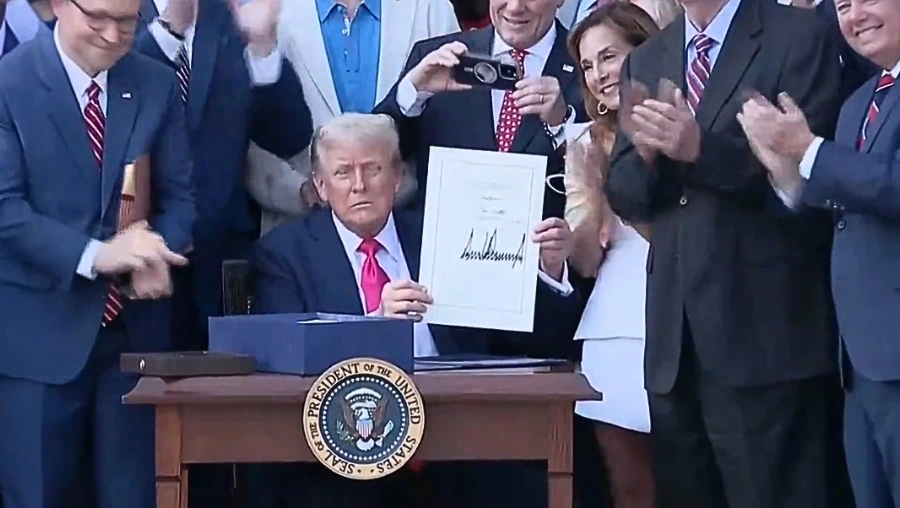Washington, July 5, 2025 – It was a triumph, staged like a play from another era. On the South Lawn of the White House stood Donald Trump, surrounded by loyalists, flanked by his cabinet members, head held high, his fist gripping a wooden gavel – a gift from Speaker Mike Johnson. With a theatrical bang, he sealed what he himself calls the “One Big Beautiful Bill”: a gigantic revival of his multi-billion-dollar tax giveaways, flanked by massive cuts to Medicaid, food stamps, and social assistance. The applause was loud, the weather patriotic. But beneath the gleaming surface of this legislation, the political foundation is already beginning to crack. What Trump celebrates as his greatest legislative victory may prove to be a toxic legacy for his own party. Democrats are already planning to make the law a central point of attack in the 2026 midterm elections. Their message is clear: Trump hands out gifts to the rich - and sends millions of poor Americans into poverty, to the hospital, or out of the system. As so often, Trump is following the script of his earlier career: branding, pressure, dominance. The measure was marketed on social media as the “One Big Beautiful Bill,” a soundbite reminiscent of a television show. The contents? Harsh financial calculus, political severity, and a strategic strike against the legacies of Obama and Biden. The 2017 tax cuts are extended. At the same time, Medicaid - the healthcare system for the needy - is cut by 1.2 trillion dollars. Food assistance for millions of families is also slashed. The Republican Party - whether reluctantly or willingly - almost entirely backed the plan. There were warnings, admonitions, doubts. But Trump relied on his usual mix of persuasion, intimidation, and public loyalty tests. In the end, they voted - and he prevailed.
What sounds like fiscal discipline on paper will, in reality, affect millions of people. According to estimates from the Congressional Budget Office, the law will cause around 11.8 million people to lose their health insurance by 2034. At the same time, tax incentives for climate-friendly technologies introduced under Biden will disappear - a reversal of years of progress in energy policy. Trump, meanwhile, is trying to sell the law as a gift to the “forgotten Americans”: no taxes on tips, relief for overtime pay, a bit of tax relief for retirees. But these measures affect only a small portion of the population - cosmetic adjustments to a law that is above all one thing: a step back to a time before the social safety net. Not everyone in the Republican Party applauded enthusiastically. Senator Thom Tillis of North Carolina warned early on that the law would severely harm his state. The projected losses of coverage were political dynamite, comparable to the backlash Democrats faced after Obamacare in 2010. Tillis voted against it - and simultaneously announced his retirement from politics. Senator Lisa Murkowski of Alaska, who ultimately cast the decisive vote in the Senate, expressed sharp criticism after the vote. The law was “not mature,” “unbalanced,” and a “mortgaged burden for socially disadvantaged regions.” Her appeal to the House to revise the bill went unheard. And so, on July 4, Trump stood as the victor - but the price of this victory is yet to be paid. Early polls indicate deep unpopularity of the law, even among independents and moderate Republicans. The White House shrugs it off. The numbers, they say, are “not reliable.” But the political climate has shifted - and it is reminiscent of 2010, when Barack Obama's healthcare reform became a political liability.
What is particularly irritating is the gap between Trump’s rhetoric and reality. Back in January, he proclaimed in the Oval Office that Social Security programs would be “loved and cherished.” No one would be affected, it would only be about eliminating “fraud and waste.” But with the stroke of a pen, that declaration of love turned into a slash-and-burn policy. Senator Brian Schatz of Hawaii put it bluntly: “Hospitals will close, people will die, electricity costs will rise - and people will go hungry.” Trump’s team, meanwhile, strikes back with aggression. In Iowa, he declared: “Democrats only hate the bill because they hate me. But I don’t care - because I hate them too.” The message is clear: this is not about compromise, not about social balance - it is about enforcement, confrontation, a demonstration of power. The consequences are tangible: the United States is entering a phase of political polarization not seen in decades. This law is not just an economic program - it is an ideological statement. Whether Trump will be able to politically salvage this victory will not be decided on the South Lawn of the White House, but in the suburbs of Pennsylvania, in the hospitals of Alaska, and in the fields of California. In those places, people are not celebrating with gavels - but with pink slips, benefit cut notices, and the question of how to survive. Because what was sold yesterday as “big, beautiful, and brilliant” is, for millions of Americans, nothing but a black holiday - signed with a gavel that stands as a symbol of reckoning.

Der Kommentar gehörte zu einem anderen Artikel.
Daher bearbeitet
Und dennoch jubeln die MAGA. Loben Tru*** in den höchstens Tönen.
Abstand und Moral gibt es bei den Republikanern nicht mehr.
Mut und Entschlossenheit gibt es bei den Demokraten nicht mehr.
Ich sehe keine Option, wie Project 2025 gestoppt werden kann